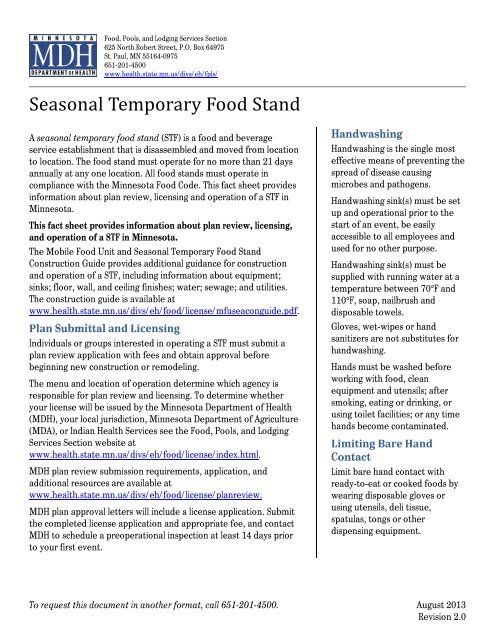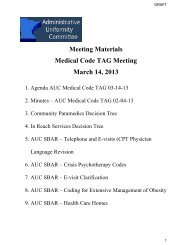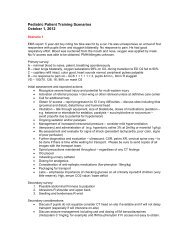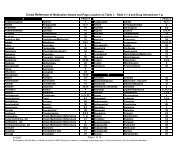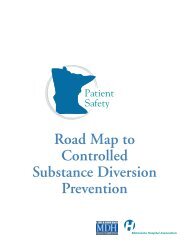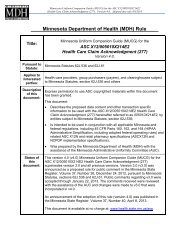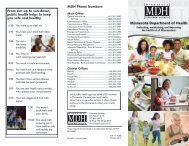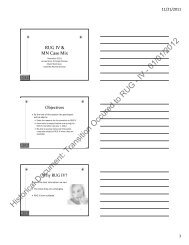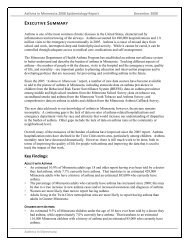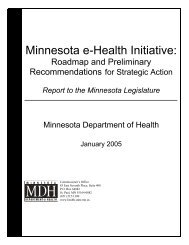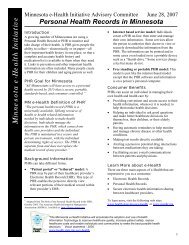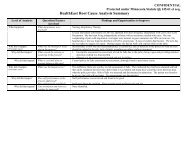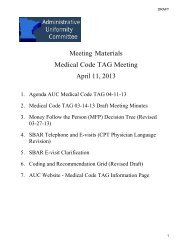Seasonal Temporary Food Stand - Minnesota Department of Health
Seasonal Temporary Food Stand - Minnesota Department of Health
Seasonal Temporary Food Stand - Minnesota Department of Health
You also want an ePaper? Increase the reach of your titles
YUMPU automatically turns print PDFs into web optimized ePapers that Google loves.
<strong>Food</strong>, Pools, and Lodging Services Section<br />
625 North Robert Street, P.O. Box 64975<br />
St. Paul, MN 55164-0975<br />
651-201-4500<br />
www.health.state.mn.us/divs/eh/fpls/<br />
<strong>Seasonal</strong> <strong>Temporary</strong> <strong>Food</strong> <strong>Stand</strong><br />
A seasonal temporary food stand (STF) is a food and beverage<br />
service establishment that is disassembled and moved from location<br />
to location. The food stand must operate for no more than 21 days<br />
annually at any one location. All food stands must operate in<br />
compliance with the <strong>Minnesota</strong> <strong>Food</strong> Code. This fact sheet provides<br />
information about plan review, licensing and operation <strong>of</strong> a STF in<br />
<strong>Minnesota</strong>.<br />
This fact sheet provides information about plan review, licensing,<br />
and operation <strong>of</strong> a STF in <strong>Minnesota</strong>.<br />
The Mobile <strong>Food</strong> Unit and <strong>Seasonal</strong> <strong>Temporary</strong> <strong>Food</strong> <strong>Stand</strong><br />
Construction Guide provides additional guidance for construction<br />
and operation <strong>of</strong> a STF, including information about equipment;<br />
sinks; floor, wall, and ceiling finishes; water; sewage; and utilities.<br />
The construction guide is available at<br />
www.health.state.mn.us/divs/eh/food/license/mfuseaconguide.pdf.<br />
Plan Submittal and Licensing<br />
Individuals or groups interested in operating a STF must submit a<br />
plan review application with fees and obtain approval before<br />
beginning new construction or remodeling.<br />
The menu and location <strong>of</strong> operation determine which agency is<br />
responsible for plan review and licensing. To determine whether<br />
your license will be issued by the <strong>Minnesota</strong> <strong>Department</strong> <strong>of</strong> <strong>Health</strong><br />
(MDH), your local jurisdiction, <strong>Minnesota</strong> <strong>Department</strong> <strong>of</strong> Agriculture<br />
(MDA), or Indian <strong>Health</strong> Services see the <strong>Food</strong>, Pools, and Lodging<br />
Services Section website at<br />
www.health.state.mn.us/divs/eh/food/license/index.html.<br />
MDH plan review submission requirements, application, and<br />
additional resources are available at<br />
www.health.state.mn.us/divs/eh/food/license/planreview.<br />
MDH plan approval letters will include a license application. Submit<br />
the completed license application and appropriate fee, and contact<br />
MDH to schedule a preoperational inspection at least 14 days prior<br />
to your first event.<br />
Handwashing<br />
Handwashing is the single most<br />
effective means <strong>of</strong> preventing the<br />
spread <strong>of</strong> disease causing<br />
microbes and pathogens.<br />
Handwashing sink(s) must be set<br />
up and operational prior to the<br />
start <strong>of</strong> an event, be easily<br />
accessible to all employees and<br />
used for no other purpose.<br />
Handwashing sink(s) must be<br />
supplied with running water at a<br />
temperature between 70°F and<br />
110°F, soap, nailbrush and<br />
disposable towels.<br />
Gloves, wet-wipes or hand<br />
sanitizers are not substitutes for<br />
handwashing.<br />
Hands must be washed before<br />
working with food, clean<br />
equipment and utensils; after<br />
smoking, eating or drinking, or<br />
using toilet facilities; or any time<br />
hands become contaminated.<br />
Limiting Bare Hand<br />
Contact<br />
Limit bare hand contact with<br />
ready-to-eat or cooked foods by<br />
wearing disposable gloves or<br />
using utensils, deli tissue,<br />
spatulas, tongs or other<br />
dispensing equipment.<br />
To request this document in another format, call 651-201-4500. August 2013<br />
Revision 2.0
<strong>Seasonal</strong> <strong>Temporary</strong> <strong>Food</strong> <strong>Stand</strong> – Page 2<br />
Employee <strong>Health</strong> and Personal Hygiene<br />
<strong>Food</strong> service employees who have been ill with vomiting and/or<br />
diarrhea should not work in a food establishment for at least 24<br />
hours after their symptoms end. <strong>Food</strong> employees must dress in clean<br />
clothing and wear an effective hair restraint such as a hairnet, hat or<br />
scarf. While preparing food, a food employee must not wear jewelry<br />
on the arms and hands, except for a wedding band or other plain<br />
ring, nor painted or false fingernails.<br />
Person in Charge<br />
The Person in Charge (PIC) must be present during all hours <strong>of</strong><br />
operation and service. The PIC must be able to demonstrate<br />
knowledge <strong>of</strong> foodborne illness prevention as it relates to the food<br />
preparation processes <strong>of</strong> the STF. The PIC is responsible for providing<br />
employees with safe food handling information needed while<br />
performing their job and to ensure the employees follow approved<br />
procedures.<br />
<strong>Food</strong> Sources<br />
All foods, beverages and ice must be obtained from approved<br />
sources. <strong>Food</strong> must be discarded after an event or at the end <strong>of</strong> the<br />
period <strong>of</strong> operation unless it is maintained at safe food temperatures<br />
using mechanical equipment at the site <strong>of</strong> the event or operation.<br />
When food is prepared at another location; a copy <strong>of</strong> that<br />
establishment’s license or the commissary agreement should be<br />
carried during periods <strong>of</strong> operation.<br />
Cleaning and Sanitizing<br />
Utensils and equipment must be washed, rinsed, sanitized and air<br />
dried after each use in an approved sanitizer at the required strength<br />
and contact time. Approved sanitizers may include chlorine bleach,<br />
quaternary ammonium or iodine. Always follow label instructions.<br />
Use the required sanitizer solution strength and contact time. Damp<br />
or soiled wiping cloths must be stored in an approved sanitizer at the<br />
required strength. Provide an appropriate test kit to check the<br />
concentration <strong>of</strong> the sanitizer used.<br />
Avoiding Cross-Contamination<br />
Do not cross-contaminate raw meats, poultry and fish with ready-toeat<br />
food. Common cross-contaminated items may include cutting<br />
boards, cooking utensils, cloths, aprons and hands.<br />
Ice can be used either as food or as a cooling medium. Ice must be<br />
stored and handled as a food product. Canned, bottled and other<br />
containerized, non-potentially hazardous beverages may be chilled<br />
in ice if the container and its positioning in the ice prevent entry <strong>of</strong><br />
water into the beverage container. Ice must be continuously drained<br />
to an approved wastewater disposal system.<br />
Safe <strong>Food</strong> Temperatures<br />
Cook all potentially hazardous<br />
food to the following<br />
temperatures or hotter: poultry,<br />
165°F; ground beef, sausage,<br />
gyro, 155°F; pork, 155°F; fish,<br />
shrimp, shell eggs, 145°F; beef<br />
steak, beef roast, lamb, 145°F.<br />
Hold hot foods at or above 140°F.<br />
Hold cold foods at or below 41°F.<br />
Never thaw foods on the counter.<br />
Provide accurate thermometers<br />
for monitoring temperatures and<br />
in all refrigeration units.<br />
For More Information…<br />
MDH <strong>Food</strong>, Pools, and Lodging<br />
Services Section<br />
District Phone Numbers:<br />
Bemidji – 218-308-2100<br />
Duluth – 218-302-6166<br />
Fergus Falls – 218-332-5150<br />
Mankato – 507-344-2700<br />
Marshall – 507-537-7151<br />
Metro – 651-201-4500<br />
Rochester – 507-206-2700<br />
St. Cloud – 320-223-7300<br />
Email:<br />
health.foodlodging@state.mn.us<br />
Website:<br />
www.health.state.mn.us/divs/eh/<br />
fpls/<br />
Web Resources:<br />
MDH <strong>Food</strong> Business Safety<br />
www.health.state.mn.us/divs/eh/<br />
food/<br />
MDH <strong>Food</strong> Business Fact Sheets<br />
http://www.health.state.mn.us/d<br />
ivs/eh/food/fs/index.html<br />
To request this document in another format, call 651-201-4500. August 2013<br />
Revision 2.0


